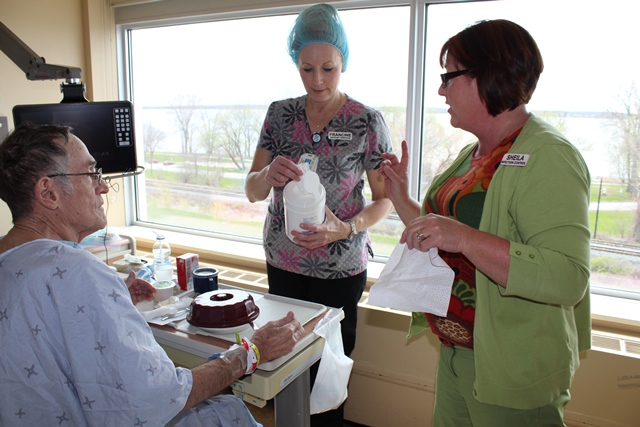
The recently launched meal-time patient hand hygiene initiative at Quinte Health Care (QHC) is having amazing results. The number of patients contracting antibiotic resistant organisms during their hospital stay has decreased.
Last year, nutrition and food services staff at QHC pointed out to managers that the hand wipes distributed to patients at meal time were not being used. An audit revealed that seventy percent of the packets were being returned unopened and when used by a patient it was after their meal. Patients were clearly missing the most important moment of patient hand hygiene, before they ate their meal.
MORE: HOW ONE HOSPITAL MADE HAND HYGIENE RATES SOAR
“Not washing your hands before eating a meal increases the patient’s risk of contracting antibiotic resistant illnesses that are transmitted through hand to mouth contact,” said Wanda Stewart, Infection Control Practitioner at QHC. “The process and the product being used here was clearly not working and that’s when we started the search for a better solution.”
The Infection Control Team began to look at alternatives that would make it easier for patients to preform hand hygiene before they eat. The old wipes were similar to regular fast food wipes which were often dried out and difficult to open. “It is very hard for someone who is unwell to get out of bed to wash their hands. The wipes we provided were difficult to open and being used at the wrong time,” says Sheila Chartrand, another member of the Infection Control Team.
A new product was found that was sturdier and in a dispenser that was easier to access. But how could QHC encourage patients to use them? The first group that came to mind was the team that identified the issue in the first place – Nutrition & Food Services!
MORE: I AM THE PATIENT EXPERIENCE
Nutrition and food services staff members deliver patient meals three times a day, so Infection Control inquired if they would be willing to play a part in improving patient hand hygiene by proactively distributing the new hand wipes. The only initial concern was adding to their already extremely busy workload at meal time. The staff enthusiastically became the drivers of the initiative.
“Nutrition and food services staff members are with the patient in that crucial moment when hand hygiene is so important in breaking the chain of transmission,” Stewart explains. “We worked out a plan that with each meal they would hand the patient a wipe directly and remind them to clean their hands before they eat.”
According to Bonnie Kerr, manager of nutrition and food services her team didn’t look for problems or excuses, just solutions. “Everyone worked together and made it work for the patient. “It’s takes that extra bit of their time, but I’ve not had one staff member complain about the extra step in their routine. They are proud to be helping patients and it’s clearly making a difference,” she says.
MORE: FLU VACCINES AND EBOLA: DO WE HAVE DUTIES TO GET AND TO GIVE?
The results were impressive. The initiative was piloted on four inpatient areas at QHC’s Belleville General Hospital and then rolled out across all four hospitals in July.
We did see a decrease in numbers on the trialing units for June, and corporately for July and August, said Chartrand.
Infection Control is committed to keeping the nutrition and food services team updated with reports of the transmission numbers so they can see the significant impact they are making to patient safety. Chartrand praised her co-workers. “I am really excited about the response from staff and how they value patient safety and have embraced their role in it. It has made such a huge difference.”

